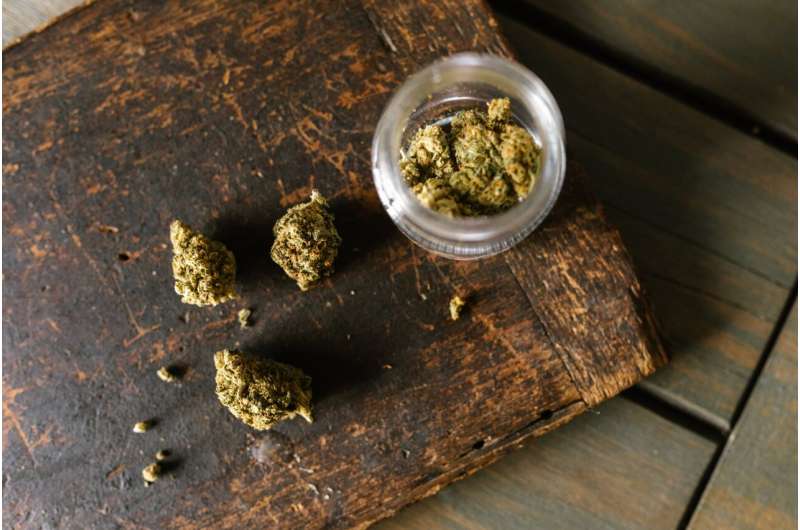This article has been reviewed according to Science X's editorial process and policies. Editors have highlighted the following attributes while ensuring the content's credibility:
fact-checked
trusted source
proofread
Cannabis use policies are on the rise yet treatment for cannabis use disorder treatment remains low

Treatment for cannabis use disorder (CUD) decreased since 2004, particularly in states with medical cannabis dispensary provisions, according to a new study at Columbia University Mailman School of Public Health. Specialty treatment for the disorder did not meaningfully change among people with past-year CUD in states with recreational cannabis legislation.
The study is believed to be the first to estimate relationships between national medical and recreational cannabis laws and self-reported CUD treatment and includes the most comprehensive years with comparable data for policy analysis.
"Our findings add to the growing evidence indicating cannabis dispensaries are a key policy lever affecting cannabis-related outcomes," noted Pia Mauro, Ph.D., assistant professor of Epidemiology. The results are published in the journal Drug and Alcohol Dependence.
Cannabis use disorder prevalence has increased among U.S. adults and has negative health and social consequences yet is rarely treated. There are currently no FDA-approved pharmacological treatments for CUD. While cannabis use in the U.S. remains illegal at the federal level, 38 states and the District of Columbia have medical cannabis laws (MCLs) and 23 states and D.C. have recreational cannabis laws as of June 2023.
"We found that specialty treatment for cannabis use disorder remained very low and decreased in states with cannabis dispensary provisions, even among people reporting past-year cannabis use disorder, which is a clinical indicator of needing treatment," said Mauro. "This translates to growing unmet treatment need throughout the U.S."
"Importantly, few people needing cannabis use disorder treatment in our study perceived a need for CUD treatment," she observed. In other studies, cannabis laws have been associated with lower cannabis-related perceived harms.
Using information from the 2004–2019 National Surveys on Drug Use and Health measured annually from the 50 states and District of Columbia, the researchers analyzed data from people ages 12 years of age and older with past-year cannabis use disorder or classified as needing CUD treatment, which also included people who reported treatment for the disorder in the past year but may have not had at least two CUD symptoms. Approximately 68,000 people were sampled yearly in the repeated cross-sections.
Specialty CUD treatment prevalence decreased by 1.35 points after medical cannabis laws were passed, and by 2.15 points for states with these laws but without dispensaries or after MCL with dispensaries provisions became effective, compared to before medical cannabis laws. Among people with CUD in 2004–2014, specialty treatment decreased only in MCL states with dispensary provisions. Changes in treatment before and after recreational cannabis laws became effective were also measured to examine effects of recreational laws above and beyond medical cannabis legislation.
Among the 2.4–2.5 percent of people ages 12 and older classified as needing cannabis use disorder treatment, 7.3–10.4 percent reported any CUD treatment, 5.2–7.0 percent reported specialty CUD treatment, and 1.4–2.6 percent perceived a need for CUD. Among the 2.3–2.4 percent of people with CUD, 4.2–6.4 percent reported any CUD treatment, 2.1–2.9 percent reported specialty CUD treatment, and 1.4–2.6 percent perceived a need for CUD treatment.
Mauro and colleagues note that recreational cannabis laws (RCLs) have previously been associated with increased cannabis use disorder prevalence between 2008 and 2016 among adults 26 and older, suggesting a greater need for treatment in states with RCL as well.
"Specialty CUD treatment remained low among people with CUD, and our findings suggest lower treatment among people without CUD in states with RCL. This could be due to changing criminal legal referrals or other mandated or coerced treatment."
"Because cannabis use disorder treatment was so low across states, we note the urgency for targeting efforts in support of people with CUD, particularly in states with cannabis dispensaries. From a structural perspective, this includes training and supporting providers to increase screening and discussions about cannabis use and ensuring access to effective evidence-based services," said Mauro.
"The findings also suggest the need for public education about the likelihood and symptoms of CUD, as well as the need for treatment when clinically indicated, in the context of changing cannabis legal status."
More information: Pia M. Mauro et al, Associations between cannabis policies and state-level specialty cannabis use disorder treatment in the United States, 2004–2019, Drug and Alcohol Dependence (2024). DOI: 10.1016/j.drugalcdep.2024.111113





















